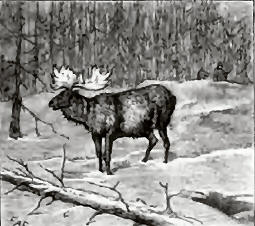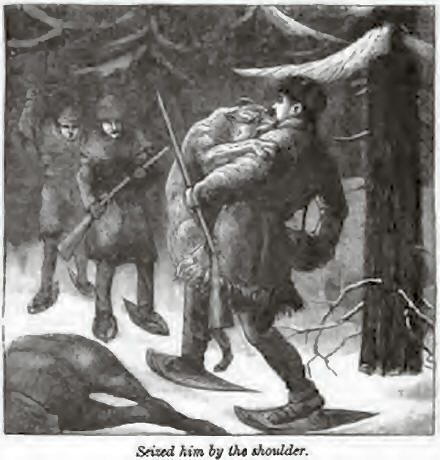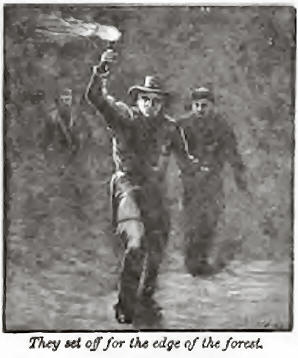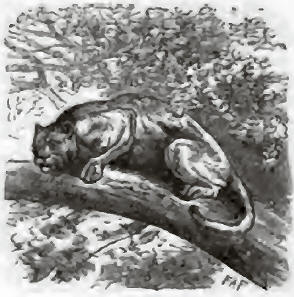 The party had proceeded many miles before they arrived at
the spot where Malachi thought that they would fall in with some
venison, which was the principal game that they sought. It was not till
near ten o’clock in the morning that they stood on the ground which had
been selected for the sport. It was an open part of the forest, and the
snow lay in large drifts, but here and there on the hill-sides the grass
was nearly bare, and the deer were able, by scraping with their feet, to
obtain some food. They were all pretty well close together when they
arrived. Percival and Henry were about a quarter of a mile behind, for
Percival was not used to the snow-shoes, and did not get on so well as
the others, Malachi and the rest with him halted, that Henry and
Percival might come up with them, and then, after they had recovered
their breath a little, he said, “Now, you see there’s a fine lot of deer
here, Master Percival, but as you know nothing about woodcraft, and may
put us all out, observe what I say to you. The animals are not only cute
of hearing and seeing, but they are more cute of smell, and they can
scent a man a mile off if the wind blows down to them; so you see it
would be useless to attempt to get near to them if we do not get to the
lee side of them without noise and without being seen. Now the wind has
been from the eastward, and as we are to the southward, we must get
round by the woods to the westward, before we go upon the open ground,
and then, Master Percival, you must do as we do, and keep behind, to
watch our motions. If we come to a swell in the land, you must not run
up, or even walk up, as you might show yourself; the deer might be on
the other side, within twenty yards of you, but you must hide yourself,
as you will see that we shall do; and when we have found them, I will
put you in a place where you shall have your shot as well as we. Do you
understand, Master Percival?”
The party had proceeded many miles before they arrived at
the spot where Malachi thought that they would fall in with some
venison, which was the principal game that they sought. It was not till
near ten o’clock in the morning that they stood on the ground which had
been selected for the sport. It was an open part of the forest, and the
snow lay in large drifts, but here and there on the hill-sides the grass
was nearly bare, and the deer were able, by scraping with their feet, to
obtain some food. They were all pretty well close together when they
arrived. Percival and Henry were about a quarter of a mile behind, for
Percival was not used to the snow-shoes, and did not get on so well as
the others, Malachi and the rest with him halted, that Henry and
Percival might come up with them, and then, after they had recovered
their breath a little, he said, “Now, you see there’s a fine lot of deer
here, Master Percival, but as you know nothing about woodcraft, and may
put us all out, observe what I say to you. The animals are not only cute
of hearing and seeing, but they are more cute of smell, and they can
scent a man a mile off if the wind blows down to them; so you see it
would be useless to attempt to get near to them if we do not get to the
lee side of them without noise and without being seen. Now the wind has
been from the eastward, and as we are to the southward, we must get
round by the woods to the westward, before we go upon the open ground,
and then, Master Percival, you must do as we do, and keep behind, to
watch our motions. If we come to a swell in the land, you must not run
up, or even walk up, as you might show yourself; the deer might be on
the other side, within twenty yards of you, but you must hide yourself,
as you will see that we shall do; and when we have found them, I will
put you in a place where you shall have your shot as well as we. Do you
understand, Master Percival?”
“Yes, I do, and I shall stop behind, and do as you tell me.”
“Well then, now, we will go back into the thick of the forest till we
get to leeward, and then we shall see whether you will make a hunter or
not.”
The whole party did as Malachi directed, and for more than an hour they
walked through the wood, among the thickest of the trees, that they
might not be seen by the animals. At last they arrived at the spot which
Malachi desired, and then they changed their course eastward, towards
the more open ground, where they expected to find the deer.
As
they entered upon the open ground, they moved forward crouched to the
ground, Malachi and Martin in the advance. When in the hollows, they all
collected together, but on ascending a swell of the land, it was either
Malachi or Martin who first crept up, and looking over the summit, gave
notice to the others to come forward. This was continually repeated for
three or four miles, when Martin, having raised his head just above a
swell, made a signal to those who were below that the deer were in
sight. After a moment or two reconnoitring, he went down and informed
them that there were twelve or thirteen head of deer scraping up the
snow about one hundred yards ahead of them upon another swell of the
land; but that they appeared to be alarmed and anxious, as if they had
an idea of danger being near.
Malachi then again crawled up to make his observations, and returned.
“It is sartain,” said he, “that they are flurried about something; they
appear just as if they had been hunted, and yet that is not likely. We
must wait and let them settle a little, and find out whether any other
parties have been hunting them.”
They waited about ten minutes, till the animals appeared more settled,
and then, by altering their position behind the swell, gained about
twenty-five yards of distance. Malachi told each party which animal to
aim at, and they fired nearly simultaneously. Three of the beasts fell,
two others were wounded, the rest of the herd bounded off like the wind.
They all rose from behind the swell and ran forward to their prey.
Alfred had fired at a fine buck which stood apart from the rest, and
somewhat farther off; it was evident that the animal was badly wounded,
and Alfred had marked the thicket into which it had floundered; but the
other deer which was wounded was evidently slightly hurt, and there was
little chance of obtaining it, as it bounded away after the rest of the
herd. They all ran up to where the animals lay dead, and as soon as they
had reloaded their rifles, Alfred and Martin went on the track of the
one that was badly wounded. They had forced their way through the
thicket for some fifty yards, guided by the track of the animal, when
they started back at the loud growl of some beast. Alfred, who was in
advance, perceived that a puma (catamount, or painter, as it is usually
termed) had taken possession of the deer, and was lying over the
carcase. He levelled his rifle and fired; the beast, although badly
wounded, immediately sprang at him and seized him by the shoulder.
Alfred was sinking under the animal’s weight and from the pain he was
suffering, when Martin came to his rescue, and put his rifle ball
through the head of the beast, which fell dead.

“Are you hurt much, sir?” said Martin.
“No, not much,” replied Alfred; “at least I think not but my shoulder is
badly torn, and I bleed freely.” Malachi and the others now came up, and
perceived what had taken place. Alfred had sunk down and was sitting on
the ground by the side of the dead animals.
“A
painter!” exclaimed Malachi; “well, I didn’t think we should see one so
far west. Are you hurt, Mr Alfred?”
“Yes, a little,” replied Alfred, faintly.
Malachi and Martin, without saying another word, stripped off Alfred’s
hunting-coat, and then discovered that he had received a very bad wound
in the shoulder from the teeth of the beast, and that his side was also
torn by the animal’s claws.
“John, run for some water,” said Malachi; “you are certain to find some
in the hollow.”
John and Percival both hastened in search of water, while Malachi, and
Martin, and Henry tore Alfred’s shirt into strips and bound up the
wounds, so as to stop in a great measure the flow of blood. As soon as
this was done, and he had drunk the water brought to him in John’s hat,
Alfred felt revived.
“I
will sit down for a little longer,” said he, “and then we will get home
as fast as we can. Martin, look after the game, and when you are ready I
will get up. What a tremendous heavy brute that was; I could not have
stood against him for a minute longer, and I had no hunting-knife.”
“It’s a terrible beast, sir,” replied Malachi. “I don’t know that I ever
saw one larger; they are more than a match for one man, sir, and never
should be attempted singlehanded, for they are so hard to kill.”
“Where did my ball hit him?” said Alfred.
“Here, sir, under the shoulder, and well placed, too. It must have gone
quite close to his heart; but unless you hit them through the brain or
through the heart, they are certain to make their dying spring. That’s
an ugly wound on your shoulder, and will put a stop to your hunting for
five or six weeks, I expect. However, it’s well that it’s no worse.”
“I
feel quite strong now,” replied Alfred.
“Another ten minutes, sir; let John and me whip off his skin, for we
must have it to show, if we have all the venison spoiled. Mr Henry, tell
Martin only to take the prime pieces and not to mind the hides, for we
shall not be able to carry much. And tell him to be quick, Mr Henry, for
it will not do for Mr Alfred to remain till his arm gets stiff. We have
many miles to get home again.”
In
the course of ten minutes Malachi and John had skinned the puma, and
Martin made his appearance with the haunches of two of the deer, which
he said was as much as they well could carry, and they all set off on
their return home.
Alfred had not proceeded far when he found himself in great pain, the
walking upon snow-shoes requiring so much motion as to open the wounds
and make them bleed again; but Malachi gave him his assistance, and
having procured him some more water, they continued their route.
After a time the wounds became more stiff, and Alfred appeared to be
more oppressed by the pain; they proceeded, however, as fast as they
could, and at nightfall were not far from home. But Alfred moved with
great difficulty; he had become very faint—so much so, that Martin
requested John would throw down the venison, and hasten before them to
request Mr Campbell to send some brandy or other cordial to support
Alfred, who was scarcely able to move on from weakness and loss of
blood. As they were not more than a mile from the house, John was soon
there, and hastening in at the door, he gave his message in presence of
Mrs Campbell and his cousins, who were in a state of great distress at
the intelligence. Mr Campbell went to his room for the spirits, and as
soon as he brought it out, Emma seized her bonnet, and said that she
would accompany John.
Mr
and Mrs Campbell had no time to raise any objection if they were
inclined, for Emma was out of the door in a moment, with John at her
heels. But Emma quite forgot that she had no snow-shoes, and before she
had gone half the distance, she found herself as much fatigued as if she
had walked miles, and she sank deeper and deeper in the snow every
minute that she advanced. At last they arrived, and found the party.
Alfred was lying insensible on the snow, and the others making a litter
of branches that they might carry him to the house.
A
little brandy poured down his throat brought Alfred to his senses; and
as he opened his eyes he perceived Emma hanging over him.
“Dear Emma, how kind of you!” said he, attempting to rise.
“Do not move, Alfred; they will soon have the litter ready, and then you
will be carried to the house. It is not far off.”
“I
am strong again now, Emma,” replied Alfred. “But you must not remain
here in the cold. See, the snow is falling again.”
“I
must remain now till they are ready to carry you, Alfred, for I dare not
go back by myself.”
By
this time the litter was prepared, and Alfred placed on it. Malachi,
Henry, Martin, and John took it up.
“Where is Percival?” said Emma.
“He’s behind a little way,” replied John. “The snow-shoes hurt him, and
he could not walk so fast. He will be here in a minute.”
They carried Alfred to the house, where Mr and Mrs Campbell and Mary
were waiting at the door in great anxiety; poor Emma was quite knocked
up by the time that they arrived, and went into her own room.
Alfred was laid on his bed, and his father then examined his wounds,
which he considered very dangerous, from the great laceration of the
flesh. Mr Campbell dressed them, and then they left Alfred to the repose
which he so much required. The state of Alfred so occupied their minds
and their attention, that nothing and nobody else was thought of for the
first hour. Emma, too, had been taken very ill soon after she came in,
and required the attention of Mrs Campbell and Mary. It was not until
they were about to sit down to supper that Mr Campbell said, “Why,
where’s Percival?”
“Percival! Is he not here?” was the question anxiously uttered by all
the party who had been hunting.
“Percival not here!” exclaimed Mrs Campbell, starting up. “Where—where
is my child?”
“He was just behind us,” said John; “he sat down to alter his
snow-shoes: the ties hurt him.”
Malachi and Martin ran out of doors in consternation; they knew the
danger, for the snow was now falling in such heavy flakes that it was
impossible to see or direct their steps two yards in any direction.
“The boy will be lost for sartain,” said Malachi to Martin; “if he has
remained behind till this fall of snow, he never will find his way, but
wander about till he perishes.”
“Yes,” said Martin, “he has but a poor chance, that is the truth. I
would have given my right arm this had not happened.”
“Misfortune never comes single,” replied Malachi; “what can we do? Madam
Campbell will be beside herself, for she loves that boy beyond all
measure.”
“It’s useless our going out,” observed Martin; “we should never find
him, and only lose ourselves; but still we had better go back, and say
that we will try. At all events, we can go to the edge of the forest,
and halloo every minute or so; if the boy is still on his legs, it will
guide him to us.”
“Yes,” replied Malachi, “and we may light a pine torch; it might be of
some use. Well, then, let’s go in, and tell them that we are going in
search of the boy; as long as Madam knows that we are seeking him, she
will not lose hope, and hope will keep up her spirits for the time, till
she is better prepared for her loss.”
There was much good sense and knowledge of the human heart in the
observation of Malachi, who, although he was aware that all search would
be useless, could not resolve to destroy at once all hope in the mind of
the afflicted and anxious mother.

They went in, and found Mrs Campbell weeping bitterly, supported by her
husband and Mary. They stated that they were going to search for the
boy, and bring him home if they could, and, taking three or four pine
torches, one of which they lighted, they set off for the edge of the
forest, where they remained for two hours with the light, shouting at
intervals; but the snow fell so fast, and the cold was so intense, for
the wind blew fresh from the northward, that they could remain no
longer. They did not, however, return to the house, but went to their
own lodge to recover themselves, and remained there till daylight. They
then went out again; the snowstorm had ceased, and the morning was clear
and bright; they went back into the forest (on the road by which they
had come home) for three or four miles, but the snow now fallen had
covered all the tracks which they had made the day before, and was in
many places several feet deep. They proceeded to where Percival was last
seen by John, who had described the spot very exactly; they looked
everywhere about, made circuits round and round, in hopes of perceiving
the muzzle of his rifle peeping out above the snow, but there was
nothing to be discovered, and after a search of four or five hours, they
returned to the house. They found Mr Campbell and Henry in the kitchen,
for Mrs Campbell was in such a state of anxiety and distress, that she
was in her room attended by Mary. Mr Campbell perceived by their
countenances that they brought no satisfactory tidings. Malachi shook
his head mournfully, and sat down.
“Do you think that my poor boy is lost, Malachi?” said Mr Campbell.
“He is, I fear, sir; he must have sat down to rest himself, and has been
overpowered and fallen asleep. He has been buried in the snow, and he
will not wake till the day of resurrection.”
Mr
Campbell covered his face with his hands, and after a time exclaimed,
“His poor mother!”
After a few minutes, he rose and went into Mrs Campbell’s room.
“What of my child,—my dear, dear Percival?” exclaimed Mrs Campbell.
“The Lord gave, and the Lord hath taken away,” replied Mr Campbell;
“your child is happy.”
Mrs Campbell wept bitterly; and having thus given vent to the feelings
of nature, she became gradually more calm and resigned; her habitually
devout spirit sought and found relief in the God of all comfort.


